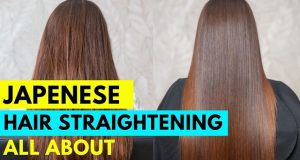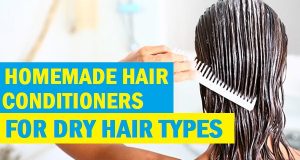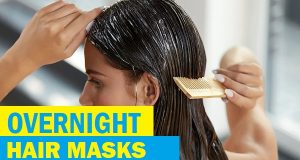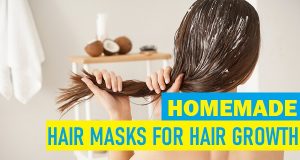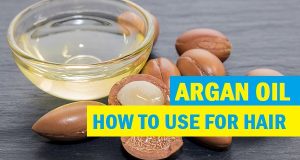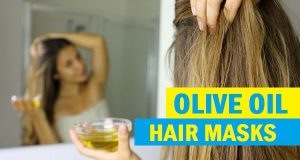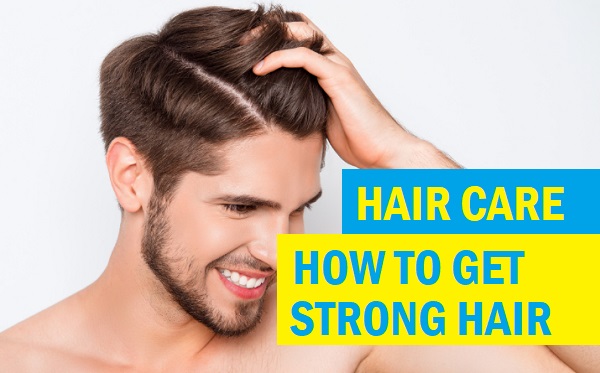
How to Get Strong Hair for Men: A Comprehensive Guide
For men, maintaining strong hair requires a combination of proper hair care practices, a balanced diet, and a healthy lifestyle. Having strong and healthy hair is not only a matter of aesthetics but also a reflection of overall well-being. In this comprehensive guide at Tips and Beauty Blog, we will explore effective ways for men to get strong hair naturally and maintain it for the long term. Hope these hair care tips for men will benefit you to achieve healthy hair in the long run.
Hair Strength and Health
Before diving into hair care practices, it’s essential to understand what hair strength means and how it relates to overall hair health. No wonders, strong hair refers to hair that is resilient, flexible, and less prone to breakage or damage.
Factors Affecting Hair Strength in Men
Hair is not just a physical attribute; it holds significance in cultural, social, and personal contexts. While hair strength might seem like a straightforward concept, various factors intricately influence its resilience and health in men. From genetics to lifestyle choices, let’s get to know, what are the different factors involved in the quality of the hair.
Genetic
Genetics plays a pivotal role in determining hair strength. Family history often dictates hair thickness, texture, and even potential hair loss that happens at different age groups. It’s like a good news that if your ancestors had robust and resilient hair, you’re likely to inherit the same attributes. However, the opposite of that hold true too.
Hormonal Balance and Hair Health
Hormones, particularly dihydrotestosterone (DHT), which significantly impact hair strength, is one of the crucial hormones. Which is why, an imbalance in DHT hormone levels can lead to hair follicle shrinkage, resulting in weaker hair over time. In facts, there are any ways and hair products which can help manage that. Baldness in men or alopecia is also associated with DHT.
Nutritional Deficiencies
Your hair’s strength is a reflection of your overall health. This is not surprising that nutritional deficiencies, especially in essential vitamins and minerals like biotin, zinc, and iron, can weaken hair strands and make them more susceptible to damage.
Hair Care Practices
How you care for your hair matters a lot! By this we mean that frequent use of harsh shampoos, excessive heat styling, and aggressive brushing can strip your hair of its natural oils and weaken its structure. This is why, using good hair care products for men is equally important. Using chemical loaded products will degrade the hair quality over the time.
Environmental Factors
Environmental stressors such as UV radiation, pollution, and harsh weather conditions can take a toll on your hair’s strength. These factors contribute to oxidative stress and protein degradation, weakening the hair’s integrity.
Stress and its Effect
Stress doesn’t just affect your mental well-being; it can also weaken your hair. Chronic stress disrupts the hair growth cycle, leading to hair thinning and breakage. For men who are stressed a lot for any reason, the tress can actually contributes to the hair loss and thinning of hair follicles.
Aging and Hair Strength
As you age, your hair’s strength can naturally decline. The production of essential proteins that contribute to hair strength, such as keratin, may decrease over time.
Medical Conditions
Certain medical conditions like thyroid disorders and autoimmune diseases can impact hair strength. Treating these conditions is essential to restore hair health. For men and women both, medical conditions are one of the major culprits for thin and weak hair.
Dietary Tips for Strong Hair
Having strong and vibrant hair goes beyond external care; it starts from within. The food you consume plays a crucial role in nourishing your hair and promoting its strength and resilience. Now that we know, let’s take a look at the variety of dietary tips for strong and healthy hair for men. The nutrients you consume impact the strength, shine, and overall health of your hair. A balanced diet rich in essential vitamins, minerals, and proteins is essential for promoting strong and resilient hair.
Essential Nutrients for Strong Hair
Several key nutrients play a significant role in maintaining strong hair. Let’s take a look below:
Proteins
We all know that protein is the building block for hair. It provides the necessary amino acids that contribute to hair structure and growth. Therefore, include lean sources of protein such as eggs, lean meats, poultry, fish, and plant-based options like lentils and beans. For that reason, Dietary changes will positively affect the hair quality. This is a great tips for improving hair quality.
Vitamin-rich Foods
Certain vitamins are essential for hair health undoubtedly. Let’s get to know what are the major ones below.
Vitamin A: This vitamin helps in promoting sebum production for a healthy scalp. Vitamin A is rich in carrots, sweet potatoes, and leafy greens. Do include then in your diet for stronger hair.
Vitamin C: Vitamin C is known to support and increase collagen production, vital for hair structure. Citrus fruits, berries, and bell peppers are a rich source of vitamin C. Don’t forget to get enough of this vitamin.
Vitamin E: It’s an antioxidant that promotes blood circulation to the scalp. One can obtain enough of vitamin E by including from nuts, seeds, and spinach in the diet.
Omega-3 Fatty Acids
Omega-3 fatty acids contribute to scalp health and can be found in fatty fish like salmon, walnuts, chia seeds, and flaxseeds. Omega-3 and Omega-6 fatty acids both can be taken to improve the strength of men’s hair.
Minerals for Strong Hair
Minerals like zinc, iron, and selenium are crucial for hair strength:
Zinc: Found in nuts, seeds, and whole grains, zinc supports hair tissue growth and repair.
Iron: Deficiency in iron can lead to hair shedding. Therefore, it will be wise to incorporate lean meats, beans, and spinach into your diet to get thicker hair.
Selenium: Not only it promotes hair follicle health but also induces hair growth. Brazil nuts, whole grains, and fish are good sources.
Hydration
Water helps transport essential nutrients to hair cells, promoting their strength and vitality. Staying properly hydrated is important for overall health, and it also benefits hair health. Drinking enough water all through the day keeps the body hydrated and hence, ensures that hair follicles receive the necessary nutrients. This way, the hair gets stronger and healthier.
Antioxidants
Antioxidants combat oxidative stress, which can weaken hair. By binding with the free radicals and neutralizing them antioxidants are actually the lifesavers of the body cells. Colorful fruits and vegetables like berries, spinach, and bell peppers are rich in antioxidants, which must be included in the diet, if you really wish to maintain thicker stronger hair.
Foods to Avoid for Hair Health
Certain foods can negatively impact hair health:
Sugary Snacks: Excessive sugar intake can lead to inflammation, affecting hair health.
Processed Foods: High in unhealthy fats and additives, processed foods offer little nutritional value.
Alcohol: Excessive alcohol consumption can lead to dehydration, which impacts hair strength.
A balanced diet is the foundation of strong hair. Always try for a variety of nutrient-rich foods, including lean proteins, whole grains, fruits, vegetables, and healthy fats.
Natural Remedies for Strong Hair for Men
Essential Oils for Hair Health
Essential oils have been used for centuries to promote hair health. These oils can either be applied directly as a scalp massage oil, or they can be mixed or blended with other home found ingredients to increase the efficiency, and then used on the hair as hair masks. Apart from the other powerful oils like Jojoba oil, coconut oil, almond oil, these oils which are mentioned below has the capability to boost blood circulation and make hair stronger.
Rosemary Oil: The excellent oil is known to stimulate hair follicles and improve circulation, promoting stronger hair growth.
Lavender Oil: Lavender oil is used a lot in various hair care products which proves its efficiency as a powerful ingredient. Helps prevent hair loss and promotes a healthy scalp environment.
Peppermint Oil: This oil is known for its scalp cooling and invigorating properties. It enhances blood circulation and may contribute to thicker hair.
Scalp Massage and Hair Strengthening
Regular scalp massages can improve blood circulation to hair follicles:
Finger Massage: Gently massage the scalp using your fingertips in circular motions to stimulate hair growth. This can be done using any suitable hair oil.
Hot Oil Treatment: Warm natural oils like coconut or almond oil and massage into the scalp for added nourishment. Hot oil treatment is an excellent hair care tip for stronger thick hair.
Natural Hair Masks for Strong Hair
Homemade hair masks can provide deep nourishment. Follow these hair care tips for men to achieve lustrous thick hair.
Egg Mask:
He hair mask is rich in protein as eggs strengthen hair strands and promote shine.
Apply egg mask by beating an egg in a bowl and directly applying it all over the hair.
Wash it off after 1 hour for that smooth and strong hair.
Aloe Vera Mask:
The hair mask for stronger thicker hair includes aloe vera. Which is quite beneficial and has no possible side effects. It soothes the scalp, reduces dandruff, and enhances hair strength.
Apply 2 scoops of aloe vera directly on the hair and leave it.
Wash it after 1 hour or can also be kept overnight.
It certainly makes hair more manageable and smoother.
Lifestyle Changes for Strong Hair
Managing Stress
Chronic stress can contribute to hair problems such as hair loss and thinning. Engaging in stress-reduction techniques such as meditation, deep breathing, and physical activity can positively impact hair health. Practice stress-reduction techniques like meditation, exercise, and deep breathing to maintain a healthy hair environment.
Regular Exercise
Regular exercise improves blood circulation, delivering nutrients and oxygen to hair follicles. It also helps in reducing stress, indirectly benefiting hair health. This is no secret that exercises has a positive overall advantage of the body.
Quality Sleep for Hair Regeneration
Quality sleep is crucial for hair regeneration and repair, we totally agree on that. Always try to get as much as for 7-9 hours of sleep each night to support healthy hair growth. You will really like the positive result it will fetch you!
Effective Hair Care Practices
Proper hair care practices for men are vital for strong hair. Additionally, these are the best hair acre routine for men’s hair.
Gentle Washing: Use a mild shampoo and avoid excessive washing to prevent stripping the hair of natural oils.
Conditioning: Use a suitable conditioner to maintain moisture and prevent breakage.
Scalp Massage: Gently massaging the scalp stimulates blood flow and supports healthy hair growth.
Heat Styling Caution: Limit the use of heat styling tools and always apply a heat protectant to minimize damage.
Avoiding Harmful Hairstyling and Treatments
Certain hairstyling practices and chemical treatments can weaken hair. Therefore, for best hair care for men these tips must be followed.
Tight Hairstyles: Avoid hairstyles that excessively pull on the hair, as they can lead to breakage.
Chemical Treatments: Minimize the use of harsh chemical treatments like bleaching and perming, which can damage the hair.
Safeguarding Hair from Environmental Damage
Environmental factors like UV rays and pollution can impact hair health. Therfeore, follow these tips for healthy thick hair.
UV Protection: Wear a hat or use products with UV protection to shield your hair from sun damage.
Pollution Protection: Wash your hair after exposure to pollutants to prevent buildup.
Role of Hair Supplements in Promoting Hair Strength
Hair supplements are designed to provide essential nutrients that support hair health from within. They can complement a well-rounded diet and help address specific deficiencies that might impact hair strength, growth, and overall appearance.
Biotin
Biotin, also known as vitamin H, is perhaps the most well-known supplement for hair health. It plays a crucial role in the production of keratin, a protein that constitutes the structure of hair strands. Biotin supplements can enhance hair strength, reduce breakage, and promote healthy growth.
Vitamins A, C, and E
Vitamins A, C, and E are antioxidants that protect hair follicles from oxidative stress. Vitamin A helps produce sebum, the natural oil that keeps the scalp moisturized. Vitamin C aids in collagen production, essential for hair structure, while vitamin E promotes blood circulation to the scalp.
Omega-3 Fatty Acids
Omega-3 fatty acids are essential fats that contribute to healthy hair growth. They nourish hair follicles and promote a healthy scalp environment. Incorporating sources of omega-3s, such as fatty fish, flaxseeds, and chia seeds, into your diet can benefit hair strength.
Saw Palmetto: Nature’s DHT Blocker
Dihydrotestosterone (DHT) is a hormone has been associated to hair loss as per various researched and clinical studies. Saw palmetto is a natural supplement that may help block the conversion of testosterone into DHT, thereby reducing the risk of hair thinning and promoting hair strength.
Collagen Supplements: Building Blocks
Collagen is a building protein that provides structure to the hair, skin, and nails. Collagen supplements can enhance hair strength by improving hair structure, reducing brittleness, and increasing elasticity.
Iron and Zinc: Vital Minerals
Iron and zinc are essential minerals for hair health. Iron supports the transportation of oxygen to hair follicles, promoting growth and strength. Zinc plays a role in hair tissue growth and repair, ensuring healthy hair follicles.
Considerations When Choosing Hair Supplements
Consult a Professional: Before starting any new supplement regimen, consult a healthcare professional to ensure that they are safe and appropriate for your individual health needs. Be specific about your allergies, if any.
Quality Matters: Always choose reputable brands that provide high-quality supplements with transparent ingredient lists.
Balance is Key: Hair Supplements or any supplement must be consumed like an add on and should not replace a balanced diet. Prioritize a nutrient-rich diet as the foundation of hair health.
How to Protect Hair from Damage
Hair damage can result from various factors, including excessive heat styling, harsh chemicals in hair products, UV exposure, and poor hair care routines. Identifying these culprits is the first step towards effective protection.
Choosing the Right Hair Care Products
To keep hair healthy always choose hair care products that are free from sulfates, parabens, and other harsh chemicals. Look for products enriched with vitamins, minerals, and natural ingredients to nourish and strengthen your hair.
Proper Washing Techniques
Wash your hair with lukewarm water and use a gentle massaging motion to clean the scalp. Avoid using excessive force as it can lead to breakage. Use a sulfate-free shampoo and conditioner suited to your hair type.
Towel Drying
Gently pat your hair with a microfiber towel to remove excess moisture. While drying the hair after the wash, avoid rubbing vigorously as it may damage the hair. Wet hair is more susceptible to damage which is why being gentle while drying is the best care one can show to their hair. A soft touch prevents unnecessary friction and breakage.
Heat Styling: Use Wisely and Protect
Limit the use of heat styling tools and always apply a heat protectant before blow-drying, straightening, or curling your hair. Using lower heat settings can also minimize damage.
Embrace Natural Hair Styles
Give your hair a break from constant styling and opt for natural hairstyles that don’t require heat or excessive manipulation. Embracing your hair’s natural texture can promote healthier strands.
Shield Hair from Sun and UV Rays
UV rays can damage hair by causing dryness, brittleness, and color fading. Wearing a hat, cap or even with the use of hair products formulated with UV protection, one can shield the hair from the sun’s harmful effects. Here, the bad effects will come as dry brittle hair and even split ends.
Regular Trims: Prevent Split Ends
Regular hair trims are excellent for preventing split ends from traveling up the hair shaft. Trimming also promotes healthier hair growth and prevents further damage. Men who like to keep long hair must follow this hair care tip without fail.
Achieving and maintaining strong hair requires a holistic approach that includes proper hair care, a balanced diet, and a healthy lifestyle. By following these tips and incorporating natural remedies, when necessary, men can enjoy strong and healthy hair for years to come. By understanding the causes of hair damage and implementing these effective tips, you can ensure your hair remains strong, vibrant, and well-nourished. Prioritize a consistent and holistic hair care routine to enjoy the benefits of strong and healthy hair.
FAQs
Q: Can hair strength be improved with external products?
A: While certain products may enhance hair appearance, true strength comes from internal health and care practices.
Q: Can genetics be overcome to improve hair strength?
A: While genetics play a role, adopting a healthy lifestyle can positively impact hair resilience.
Q: Are hair supplements effective for strengthening hair?
A: Supplements can help if you have specific nutritional deficiencies. Consult a health care professional before consuming any supplement.
Q: Can stress-related hair thinning be reversed?
A: Managing stress can improve hair health, but it may take time to see visible results.
Q: How to protect hair from environmental damage?
A: Wear protective hairstyles, use hair products with UV protection, and shield your hair from harsh weather conditions.
Q: Can a healthy diet alone promote strong hair in men?
A: While diet is crucial, adopting a holistic approach that includes hydration, stress management, and proper hair care is essential.
Q: How often should men wash their hair?
A: Washing hair 2-3 times a week is generally sufficient to maintain hair health. Over-washing can strip natural oils.
Q: Can stress cause hair loss in men?
A: Yes, it is clinically proved that the chronic stress can negatively impact the hair growth cycle and as a result has can become thin and men can even experience bald patches and hair loss.
Q: Is it necessary for men to use heat protectants?
A: Yes, using heat protectants before styling helps prevent heat-related hair damage.
Q: Can lifestyle changes reverse hair loss in men?
A: While lifestyle changes can improve hair health, addressing significant hair loss may require professional consultation.
For men seeking strong and resilient hair, adopting a hair-friendly lifestyle is key. By making conscious choices in terms of diet, hydration, stress management, exercise, and hair care practices, men can promote healthy and vibrant hair. Remember that consistency is vital, and the positive changes you make today will contribute to the strength and vitality of your hair indeed.
 Tips and Beauty Site about Skin care, Hair care, Health, weight loss and lifestyle tips
Tips and Beauty Site about Skin care, Hair care, Health, weight loss and lifestyle tips

